简明商务英语口译教程Unit 7
- 格式:ppt
- 大小:236.50 KB
- 文档页数:22
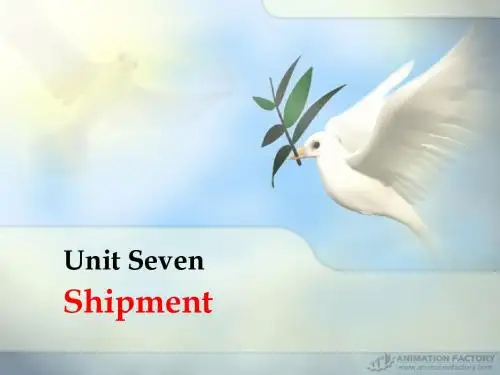
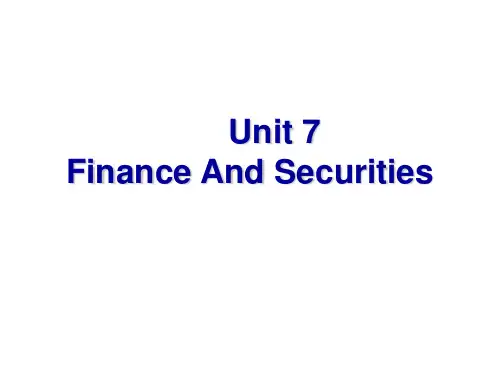
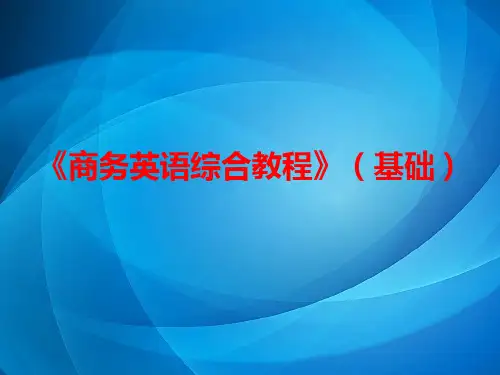
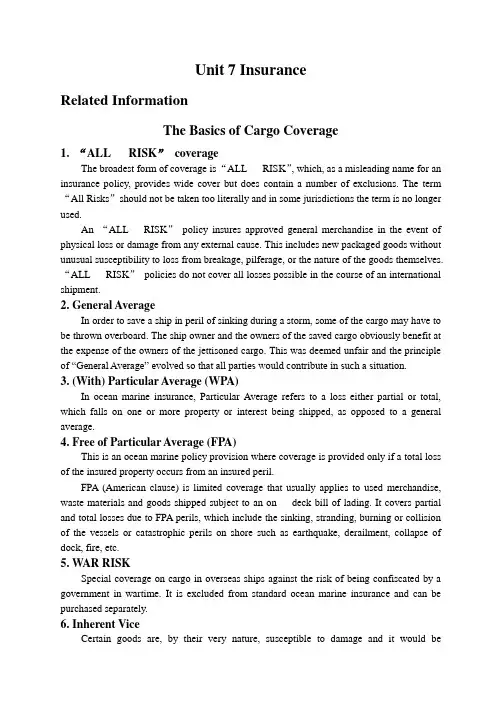
Unit 7 InsuranceRelated InformationThe Basics of Cargo Coverage1. “ALL RISK”coverageThe broadest form of coverage is “ALL RISK”, which, as a misleading name for an insurance policy, provides wide cover but does contain a number of exclusions. The term “All Risks”should not be taken too literally and in some jurisdictions the term is no longer used.An “ALL RISK”policy insures approved general merchandise in the event of physical loss or damage from any external cause. This includes new packaged goods without unusual susceptibility to loss from breakage, pilferage, or the nature of the goods themselves. “ALL RISK”policies do not cover all losses possible in the course of an international shipment.2. General AverageIn order to save a ship in peril of sinking during a storm, some of the cargo may have to be thrown overboard. The ship owner and the owners of the saved cargo obviously benefit at the expense of the owners of the jettisoned cargo. This was deemed unfair and the principle of “General Average” evolved so that all parties would contribute in such a situation.3. (With) Particular Average (WPA)In ocean marine insurance, Particular Average refers to a loss either partial or total, which falls on one or more property or interest being shipped, as opposed to a general average.4. Free of Particular Average (FPA)This is an ocean marine policy provision where coverage is provided only if a total loss of the insured property occurs from an insured peril.FPA (American clause) is limited coverage that usually applies to used merchandise, waste materials and goods shipped subject to an on deck bill of lading. It covers partial and total losses due to FPA perils, which include the sinking, stranding, burning or collision of the vessels or catastrophic perils on shore such as earthquake, derailment, collapse of dock, fire, etc.5. WAR RISKSpecial coverage on cargo in overseas ships against the risk of being confiscated by a government in wartime. It is excluded from standard ocean marine insurance and can be purchased separately.6. Inherent ViceCertain goods are, by their very nature, susceptible to damage and it would beunreasonable to expect insurers to pay for such damage. Examples of Inherent Vice are deterioration of Perishable Goods, spontaneous fermentation or combustion of improperly dried grain.7. WAREHOUSE TO WAREHOUSE protectionMost cargo insurance protects goods in transit from the time they leave the shipper’s warehouse until they reach the consignee’s warehouse, as long as they are not taken out of the normal course of transit by the insured.Lead-in1. Listening1. D2. BTape Script:Tim is talking to Judd about the insurance of a product order.Tim: Good morning, this is Tim. Is that Judd?Judd: Yes, this is Judd speaking.Tim: I’m calling to discuss the insurance coverage you requested for your order.Judd: Good, we requested an amount thirty percent above the invoice value.Tim: We have no problem complying with your request, but we think that the amount is a bit excessive. You know according to our usual practice,we insure the goods only for 10% above the invoice value.Judd: Yeah, but in the past, we’ve really been put in a bind because of damaged goods. Tim: I understand your concern. However, usual coverage for goods of this type is the total invoice amount plus only ten percent.Judd: We could feel more comfortable, though, with thirty percent.Tim: Unfortunately, if you want the increase in coverage, the extra premium will be for your account.Judd: But shouldn’t your quotation include adequate coverage against risks?Tim: That quotation involved normal coverage, but not all. So I suggest you contact your insurance agent there and compare rates.Judd: OK. Thanks. I’ll check it out.2. Spot DictationPart 1 1. T 2. T 3. F 4. F 5.FPart 2 1.practice 2. insurance 3. insure4. the People’s Insurance Company of China5. premium6. covered Tape Script:Sophia: According to our usual practice, we do business with our customers on a CIF basis, Mr. Smith.Smith: That’ s good . It will save us a lot of time because we don’t need to deal with so many insurance formalities. But I’d like to know how much the premium is .Sophia: Well, Mr. Smith, it will vary according to the types of risks to be covered.Smith: I see. Which company do you usually insure with?Sophia: We always insure our goods with the People’s Insurance Company of China. Smith: That’s great. May I ask what insurance you will cover according to your usual CIF terms for these glassware?Sophia: We usually insure against All Risks for glassware.Smith: Including War Risk?Sophia: No, War Risk is a special additional risk and it has to be arranged separately.Generally speaking, it is not necessary to insure against that risk ,as All Risks has provided enough protection to your order.Smith: I see. Thank you for your information.Text ALanguage Study1. insurance①n.the contract made by a company or society, or by the state to provide a guaranteeof compensation for loss, damage, sickness, death, etc in return for regular payment 保险◆People without insurance had to pay for their own repairs.arrange/cover/ effect / provide/ take out + insurance 办理保险◆Under FOB terms, insurance is to be covered by the buyer.insurance company 保险公司insurance policy 保险单insurance certificate 保险凭证insurance premium 保险费insurance value/ amount 保险金额insurance agent 保险代理人②insure vt.make a contract that promises to pay sb an amount of money in case ofaccident, injury death, etc, or damage to or loss of sth 保险,投保◆Every company would insure itself against loss or damage to its property.insurer n.承保人the insured n. 被保险人2. As a large percentage of our foreign trade in and out of this country goes by ship, what mainly concerns us is still the marine Insurance.此句中what mainly concerns us 是主语从句,所以后面的谓语动词用单数。
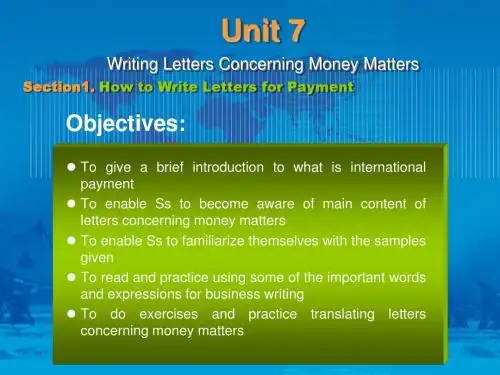
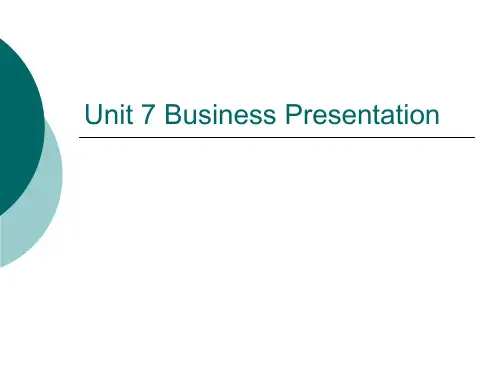
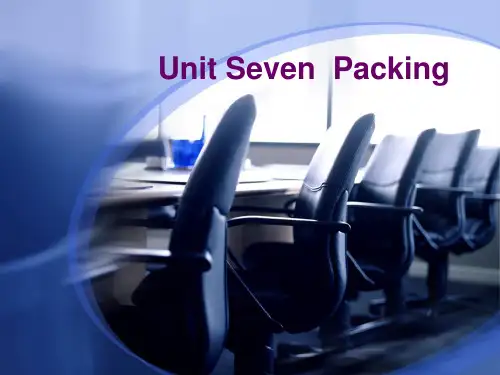
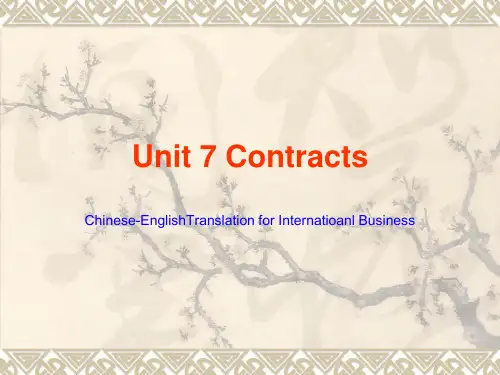
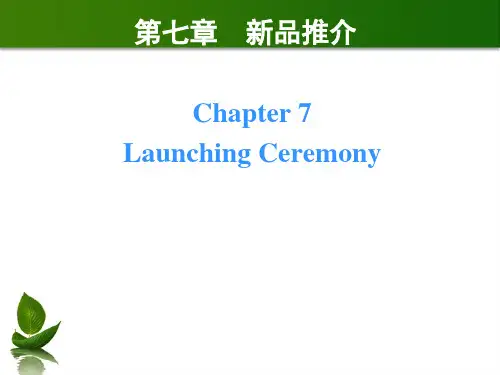
![简明商务英语口译教程Unit 7[精]](https://uimg.taocdn.com/fd0552ec83d049649b665878.webp)

Passage 4Address by Premier Wen Jiabao at the Opening Ceremony of the 7th World Expo International Forum尊敬的蓝峰主席、洛塞泰斯秘书长,各位来宾、女士们、先生们:President Jean-Pierre Lafon,Secretary General Vicente Gonzales Loscertales,Distinguished Guests,Ladies and Gentlemen,我很高兴出席第七届上海世博国际论坛。
我谨代表中国政府,对出席论坛的各位嘉宾表示热烈欢迎,并衷心祝愿这次论坛取得圆满成功!It is truly a pleasure for me to attend the 7th World Expo International Forum. On behalf of the Chinese government, I warmly welcome all the guests to the forum and sincerely wish the forum a complete success.世博会是人类文明成果荟萃的伟大盛会,每一届世博会都成为见证人类文明发展的重要驿站。
一部世博会的历史,是人类从落后走向进步、从封闭走向开放、从冲突走向合作、从崇拜物质走向崇尚科学的历史。
The World Expo is a great event showcasing the fruits of human civilization. Each World Expo is an important stage that bears witness to thedevelopment of human civilization. The history of the World Expo is a history of mankind moving from backwardness to progress, from closeness to openness, from conflict to cooperation and from material worship to the pursuit of science. The famous saying that “E verything begins with the Expo” well illustrates the huge influence of the World Expo on mankind.“一切始于世博会”这句广为传诵的名言,道出了世博会对人类的巨大影响力。
第七单元服务行业TEXT A 服务行业与服务管理我们现在正处于一个服务的时代,并且服务已经逐渐处于社会的中心地位。
在美国,各种各样的服务占据了美国就业市场的80%,服务行业已经创造了GNP的74%,占经济活动的55%,这些都远远把制造业抛在了后面。
其它发达国家也在过去的20年内同样也经历了这样一个趋势。
因此我们必须首先弄懂,“什么叫服务?〞我们通常把服务叫做由个人或团体为获益他人而做的工作。
我们的经济结构和贸易理念一起在改变,而这种改变最终导致由产品为中心转移到以服务为中心,被称为“第二次革命〞和“信息社会的开端〞。
那什么叫服务行业呢?当政府官员或经济学家提到服务行业,他们总会定义其为“创造不可见产品的行业。
〞服务行业分为以下几个部分。
运输服务、邮递服务和仓储服务信息服务股票证券服务和其它金融投资服务租赁服务职业、科技服务行政服务、废物回收服务和维修服务健康保健服务与社会援助服务艺术、娱乐、休闲服务其它服务从上面的分类我们可以看出,现今服务已经渗透到我们生活的各个角落。
不言而喻服务在我们的日常生活与商务活动中扮演越来越重要的角色。
然而并不是所有人与公司或组织会意识到服务的重要性。
许多经理像鸵鸟一样只是把它们的头深埋在沙子里,许多人袖着手违心地说,“服务大潮只不过像一阵风罢了,不是吗?〞当然,从另一方面,也有许多工作人善于服务,请看下面的案例。
Stew Leonard 经营着一家利润丰厚的三层楼的商店。
他说每当他看到一个愠怒的顾客就如同看到5万美元飞出了他的商店。
为什么呢?因为,像这种一般的顾客每个星期花100美元,一年有50周要购物,然后呆在这个地方可能大约10年。
如果这样的一个顾客在商店有一次不愉快的经历而反而转身另外一家商店的话,那Stew Leonard商店就会少5万美元的收入。
如果这个不满意的顾客把他的不愉快的经历告诉其他顾客,让他们也离开的话,那损失将会更大。
为了挽回顾客,Stew Leonard商店创造了被《纽约时报》称为“商店中的迪斯尼乐园〞,设有化妆的卡通人物、定期的娱乐项目、宠物乐园与电子动物。
Module 7 Reconstruction skillsI Theory and skills翻译不是在两种语言中寻找字词和句法的完全对应,而是追求信息的对等。
但是由于时间和心理上的巨大压力,口译员在工作时容易受原语的限制,在译文中常会生搬硬套原语的表达和结构,使译文不符合目的语的习惯,有时甚至有些不知所云。
译员听到一段讲话后应尽量脱离原语的结构,抽取其含义,用符合目的语习惯的方式将信息重新组织。
口译表达的过程其实是一个信息重组的过程。
由于汉英两种语言文化的巨大差异,有些表达方式直译过来并不能在目的语中产生所预期的效果。
有的字词在目的语中没有现成的对等词汇,需进行必要的解释。
有的讲话人因为过于紧张或准备不足而罗嗦重复,词不达意,甚至说到一半就卡壳,这种情况下译员应本着忠于讲话人的原则,对讲话进行必要的整理和补充,以协助讲话人传递信息。
常用的重组技巧有句法转换、释义、增补、省略等几种。
转换有词性和句型的转换,例如英语中的名词和介词在汉语中常常译为动词,如“He is a good public speaker.”译成“他很擅长演讲”;而“我谨代表(厦门)市委市政府……”则转化为英语的介词结构:“on behalf of the municipal government, and the CPC (Xiamen ) committee”才更符合英文的习惯。
释义(paraphrasing)也是口译中一种重要的语言转换技巧。
对于口译员来说,一词多译或一句多译的练习十分重要,因为这种变通能够帮助译员避免口译中因为某些词句而卡壳,导致口译不连贯甚至中断。
增补(addition)和省略(omission)的重组技巧并不意味着在组织译文时可以任意自由发挥,而是要使之符合目的语习惯,并协助发言人更好地传达其说话意图,帮助听众更好地理解信息。
如前文提到的发言人重复罗嗦的时候译员可以省略罗嗦的部分,发言人想表达却没能表达出来的意思可以帮助他表达完整;如遇到发言人是专家而听众都是非专业人士的情况下,可以适当对一些专业词汇进行解释,帮助听众更好地接收信息。